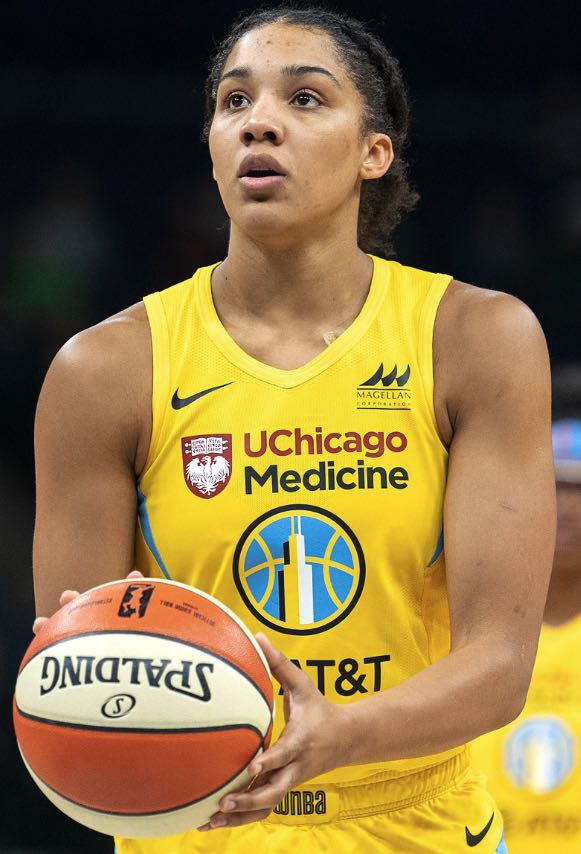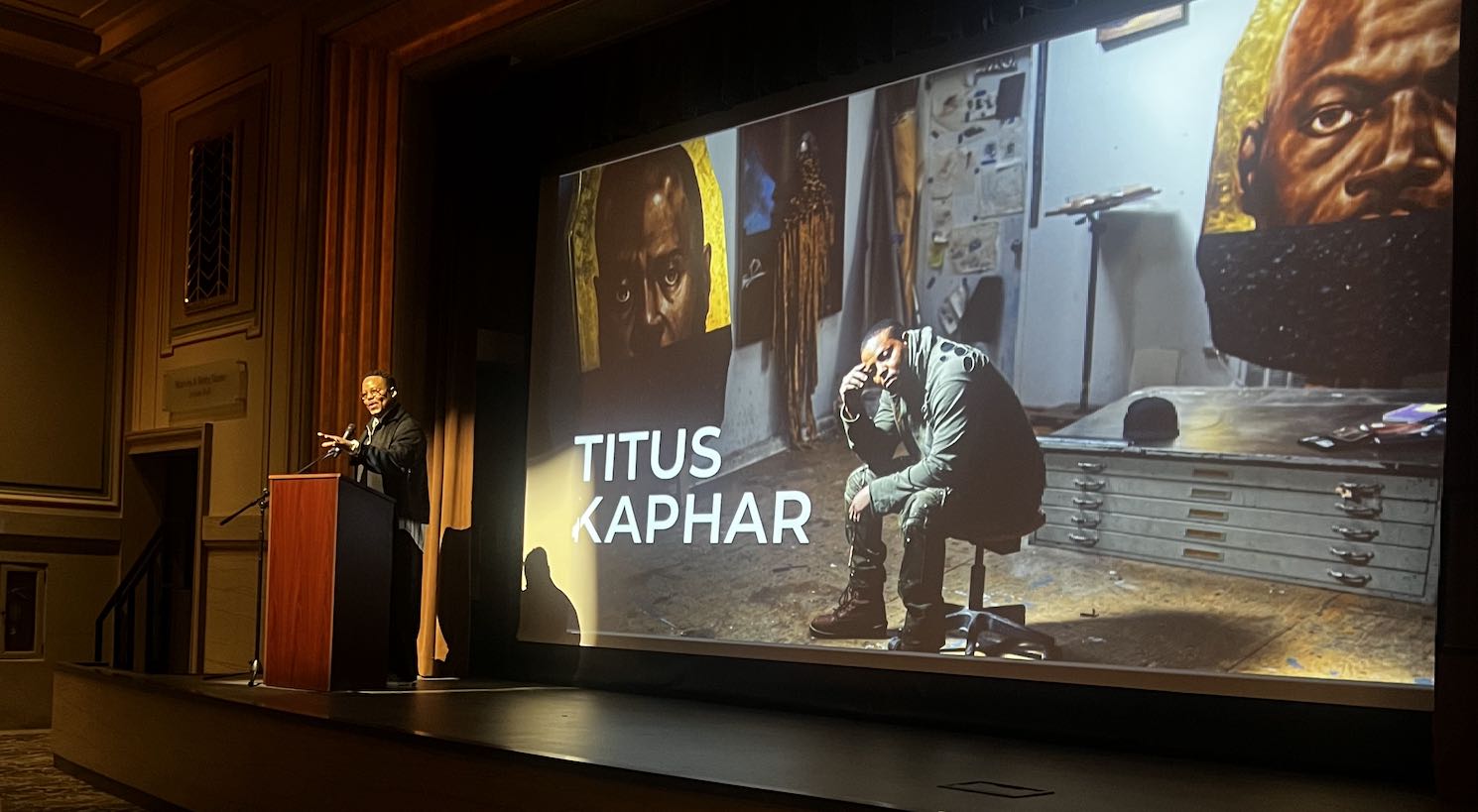By A. Noel White
The WNBA is a league chock-full of players who up until recently had to travel outside the United States just to earn a proper living.
This past summer’s WNBA All-Star Weekend in Indianapolis, Ind., U.S.A. had more eyes on it than ever before. Not only due to the heightened visibility of the league and its players, but also due to the very popular player stream, StudBudz, where Minnesota Lynx players Courtney Williams and Natisha Hiedeman gave fans an inside, behind-the-scenes look at the star-studded, athletic weekend.
That weekend in Indiana also included the immediate aftermath of a collective bargaining agreement (CBA) conversation between the players and the league. The conversation was so stressful and unproductive from the players’ perspective that Williams, via livestream upon returning to her hotel room, was seen immediately taking a shot of alcohol while blasting her favorite song, Chappel Roan’s “Pink Pony Club,” to pick up her mood.

Also attending that meeting was international WNBA star player Gabby Williams (no relation). You remember Gabby Williams, don’t you? She’s the Adult Cross-Cultural Kid forward who almost handed the U.S. women’s basketball team their first non-gold-medal appearance in the Olympics.
Williams — who was born and raised in Nevada, U.S.A. by a U.S. father and French mother, has dual citizenship and plays for the French national team — is bringing that same no-nonsense intensity to the negotiating table.
During the All-Star weekend media availability, Williams spoke about her current position on the league’s prioritization rule, which since the 2023 season has required players with two or more years of WNBA service to prioritize the WNBA over overseas leagues by reporting to their WNBA teams by a set deadline, which sometimes would conflict with the ending of women’s leagues abroad.
“Honestly, I think prioritization is not going in, for me, in the right direction,” Williams says. “They just want to bar us from [other leagues] without paying us more than these leagues pay us. I think there’s a little bit of delusion in the W[NBA] to think we’re getting paid more in the W for it as well.”
Williams — who ended the quote with a chuckle — highlights one of the major inconveniences for the league and its narratives. She, as an Adult CCK, understands she has options regarding where to play and how to earn an income. Williams is a player who has left the WNBA before to play in Spain, Hungary, France and, most recently, Turkey.
PLAYING ABROAD TO EARN A LIVING
Williams, like many WNBA players, is not accustomed to the life they are fighting for: a life of stability while only having to play for a single league for a single season. That lack of stability and comfort may be their best tool in dealing with the WNBA during the collective bargaining period.
They just want to bar us from [other leagues] without paying us more than these leagues pay us.
While the WNBA may appear to be a dream, the situation is much more complicated. Many international players face complex challenges with transfers, national duties and low pay. U.S. stars often make similar sacrifices, spending seasons abroad to sustain their careers.
Ever wondered what happened to Chennedy Carter, the phenom guard drafted fourth overall out of Texas A&M in the 2020 WNBA Draft? Well, tired of clashing with the WNBA despite being a top scorer, she went to Mexico to win a championship. Remember Britney Griner’s detention in Russia? She, too, was there to maximize her income.

According to Sportico, about half of WNBA players also competed overseas in 2023 — a drop from over 60% in the 2010s. With more endorsement deals and the launch of the “Unrivaled” 3-on-3 women’s pro basketball league founded by WNBA stars Napheesa Collier and Breanna Stewart, players now have alternatives to international travel, though overseas play still offers familiar opportunities despite the challenges of living abroad.
Brenden Potts, who covers the WNBA for “World Exposure Report,” gave a simple rationale as to why that is the case.
“Players are worth way more [abroad] than what they’re being paid here [in the U.S.]. Overseas, they’re getting exponentially more and that’s why they go,” Potts says.
In early August 2025, WNBA legend Diana Taurasi’s Amazon Prime Video docuseries “Taurasi” premiered, showcasing her journey to becoming one of the best WNBA players of all time.
In episode two, “Rolling in Rubles,” she confirms Potts’ assessment, reflecting on becoming a Third Culture Adult while playing in Russia, detailing her struggles to adjust and why she continued balancing overseas play with the WNBA. For her and rival Sue Bird, Russia offered life-changing salaries, revealing why so many top WNBA players pursued greater financial security abroad while doing the same work they did in the United States.
“We weren’t making that much money [in the WNBA], so generational wealth was coming from going to Russia every year,” says Taurasi during the premiere of her docuseries. “Now, we have to come back home and get paid nothing to play in a harder league, in worse conditions, against the best competition in the world. The f–king janitor in the arena made more than me.”
Players are worth way more [abroad] than what they’re being paid here [in the U.S.]. Overseas, they’re getting exponentially more and that’s why they go.
Fellow retired legend Candace Parker likened the WNBA to a “summer job” that provided a supplementary income.
On her podcast, “Post Moves with Candace Parker and Aliyah Boston,” Parker says: “If you’re one of the best players in the world, you get endorsements, but the opportunity to make money overseas was just too enticing. And the way you take care of your family is, you go overseas.”
Parker was drafted first overall in the 2008 WNBA Draft, four years after Taurasi’s top choice. Though the allotted contract had increased from $42,000 to $100,000 by that point, the conclusion was the same: If they wanted to see the million-dollar payday they felt they deserved, they would have to play outside of their home country.
LESSONS FROM SOCCER
Atlanta United color commentator and “Soccer Down South” podcaster Jason Longshore suggested the WNBA could learn from Major League Soccer’s approach to international play.
From its inception, MLS has had to navigate the dominance of global leagues like the U.K.’s Premier League, Spain’s La Liga and Italy’s Serie A while still attracting stars such as David Beckham, Lionel Messi and Carlos Vela. By operating under FIFA’s transfer system of loans and sold contracts — rather than competing for players with multiple deals — MLS avoids prioritizing one league over another.
“If I’m the WNBA, I would set up the bully position here and say, all right, I’ve got Rhyne Howard under contract to the Atlanta Dream. If she wants to go play in the offseason when we’re not playing, cool, I’ll loan her to Juventus in Italy,” Longshore says.
Revamping the ideas and policies around prioritization and international play could help both sides reach a CBA agreement.
Greg Clarkson of the radio show “Sam and Greg on the Weekend” asks: “Serious question: [Does the WNBA] have the right commissioner [in Cathy Engelbert]? Because whoever is in charge is going to shape investments and policies moving forward.”
The players could be asking themselves that question as they have expressed numerous grievances with Engelbert, including being slow to speak on issues affecting them, from online hate and death threats to the recent interruptions of games due to sex toys thrown on several courts in several cities.
The WNBA’s ongoing CBA conversation will be a lengthy and nuanced one, filled with grievances that need fixing and compromises that will have to be agreed on by both parties. In the midst of this conversation stands CCK and TCA players who have traveled many miles to play the sport that they love while also making a living. Those same TCAs have experiences and options that can help decide the future of pay at home and abroad, for all parties involved.

















